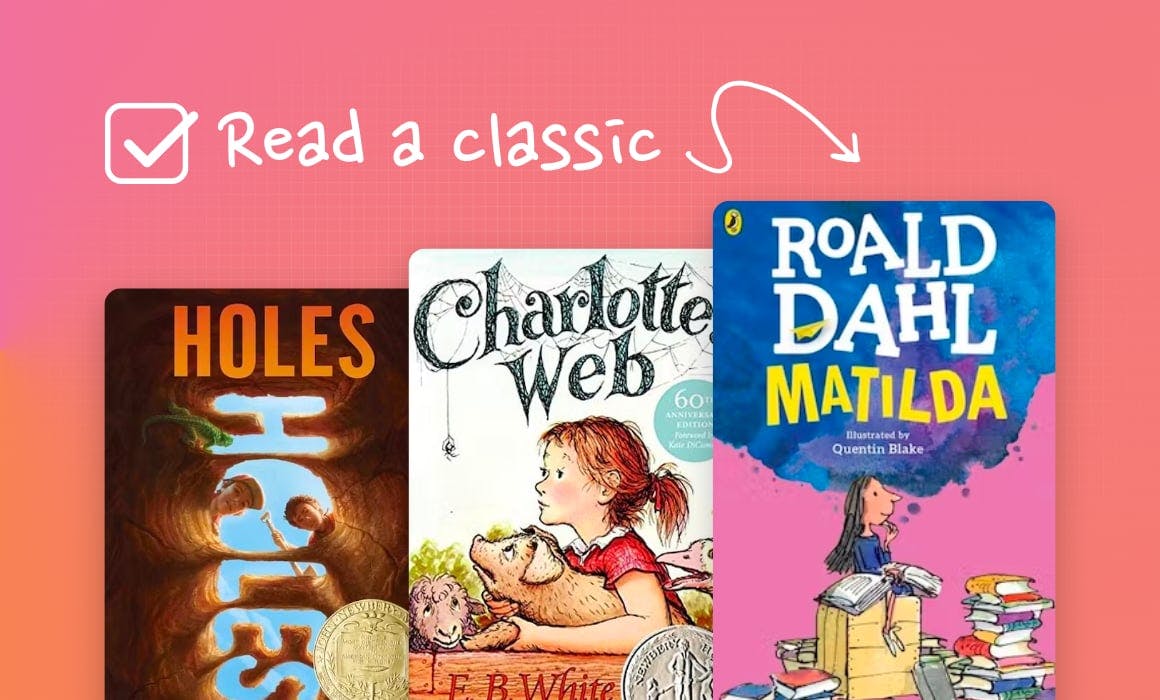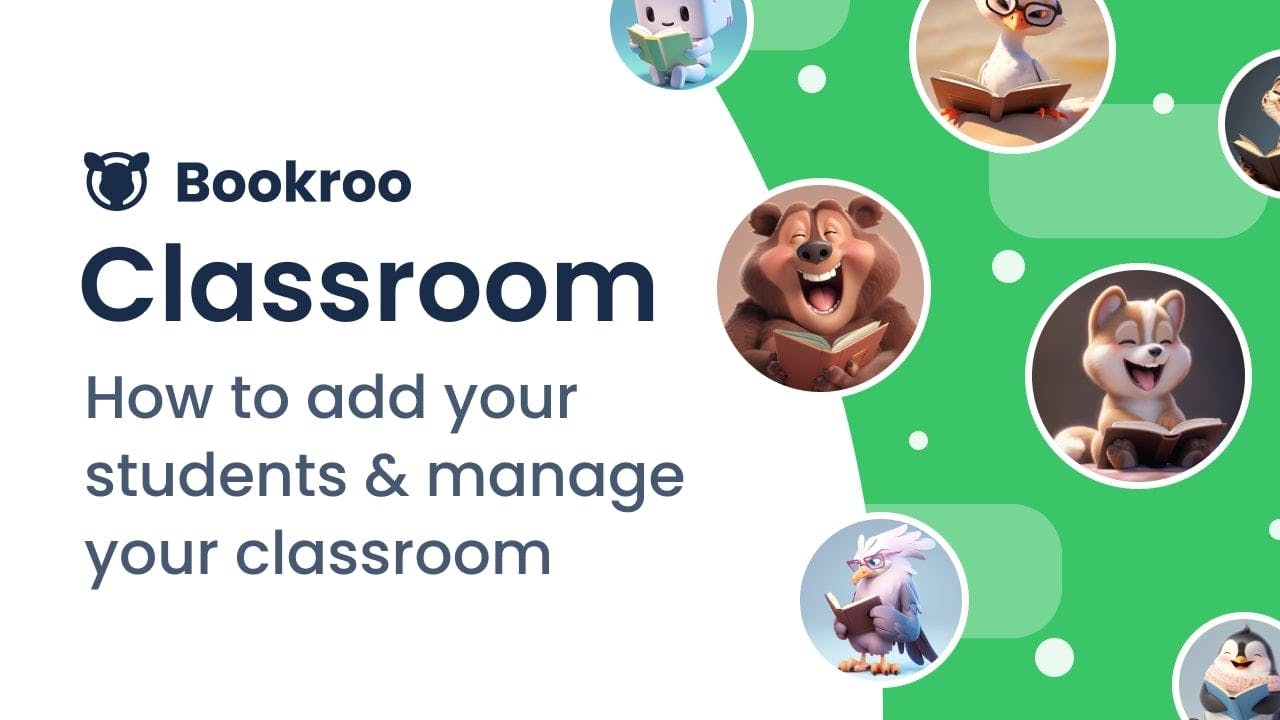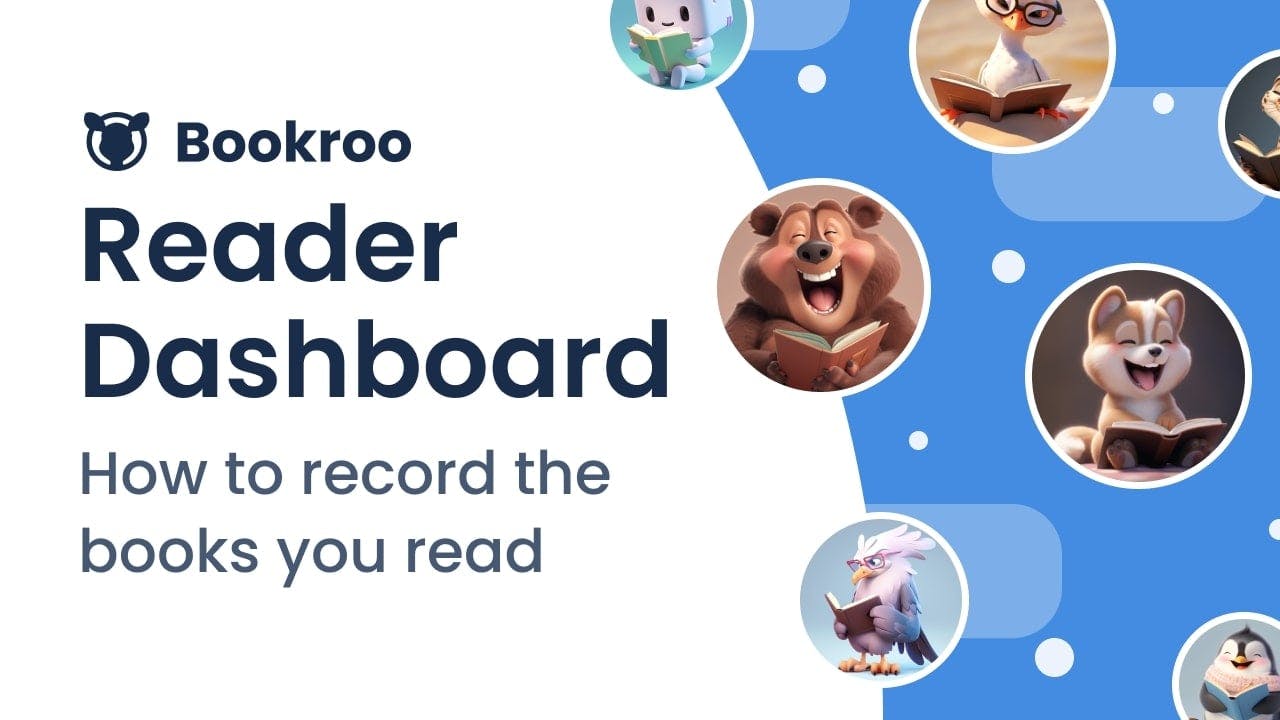Join 100,000+ other K-12 readers
Supports
Google Classroom
Bookroo Classroom: An Alternative to Accelerated Reader
Validate reading and motivate an entire classroom of readers
"In my 19 years of teaching, this is by far the most motivated my students have ever been when it comes to reading!"
- Mrs. T, 4th Grade Teacher
Book Quizzes
Measure reading accountability—without decreasing motivation.
Bookroo replaces outdated quiz systems with a modern approach that keeps students reading while giving teachers the insights they need.
Bookroo Book Quizzes
Bookroo combines a large library of premade quizzes with our smart "one-click" quiz request system, giving students the freedom to read what they want and allowing our expert quiz writers to rapidly respond. It's a student-driven solution that keeps everyone happy.
- Multiple-choice questions
- Audio support for all books
- Language-specific quizzes
- Automatically graded—retakes allowed
- 15,000+ premade quizzesView list
- New quizzes added weekly
Custom Book Quizzes
Need something specific? We provide you with powerful tools to create your own custom quizzes. Reading a book as a class? Create a unique quiz for each portion of the book. Assign quizzes to the whole class or to specific groups.
- Open response & multiple choice questions
- Auto & manual grading
- Assign to all or partial students
- Growing database of book-specific questions
Bookroo vs. Accelerated Reader
See why more educators are choosing Bookroo to validate, motivate, inspire, and reward student reading
Key Features
Bookroo
Accelerated ReaderAR
Reading Comprehension Quizzes
100% Audio-Supported Quizzes
Language-Specific Quizzes
Student/Parent Reports
Teacher Reports
One-click Quiz Requests
Customizable Quizzes
No Implementation Fees
No Annual Setup Fees
Digital Rewards Shop
Word Millionaire Badges
Student Avatars
Biblioria Trading Cards (TCG)
Personalized Rewards
Individual Reading Challenges
Classroom Reading Challenges
Written Book Reviews
Realtime Barcode Scanning
Book Fairs & Book Orders
Summary
Bookroo provides K–12 educators with powerful, easy-to-use quizzing tools to help validate student reading progress, plus additional tools that motivate, inspire, and reward a classroom of readers—all at a fraction of the cost.
Reading Challenges
Individual, collaborative, competitive—even BINGO—we’ve got it all. Automated, flexible, and 100% customizable. Oh, and highly motivating to students.
- Specific books (or read one of the following)
- Specific genres
- Minimum number of pages
- Graphic Novels, Fiction vs Non-fiction
- Allow long books to count as multiple
Teacher favorite
40 Book Challenge
Challenge your students to read a minimum number of books. Personalize the challenge for each student to adjust for each student's abilities. Add constraints like:
Read one of these books


Book #1
Read an Autobiography

2
Autobiography
Book #2
Read Stuart Little

Book #3
. . .
Any book

40
Any book
Book #40
Additional Challenges

Collaborative Challenges
It's all about teamwork! Can your students work together to reach the reading goal?

Competitive Challenges
Feeling competitive? Challenge another class or school to see who can read the most!

Bookroo Challenges
Encourage your students to join Bookroo's monthly challenge and earn Biblioria Trading Cards
Reading Analytics
All the data you'd want to understand your students' reading health

Student Quiz Logs
Is a student passing their quizzes?

Printable Quiz Reports
Stay in sync with parents

Teacher Analytics
View in depth details for any quiz

Classroom Statistics
How’s the whole class doing?

Book Difficulty Charts
Are the books too hard or too easy?

Reading Baseline Charts
Are my students reading consistently?

Activity Feed
A visualize feed of students' reading

Reading Stats
How many books have my students read?

Last & Current Book
What are my students reading?

Genre Radar Chart
What genres are my students reading?

Book Target Audience
What types of books are my students reading?

Day of the Week
What day of the week do my students read?

Reward Points
How many points have my students earned?

Reading Report
A detailed reading report for each student
“It is a capital mistake to theorise before one has data. Insensibly one begins to twist facts to suit theories, instead of theories to suit facts.”
- Sherlock Holmes, A Scandal in Bohemia
Digital Rewards
Students can earn up to  1,000 points per week when they record what they are reading. When a student finishes a book, they can reflect on it to earn
1,000 points per week when they record what they are reading. When a student finishes a book, they can reflect on it to earn  gems. Students can use their points and gems to unlock reading-themed rewards.
gems. Students can use their points and gems to unlock reading-themed rewards.
Student favorite
Reader Avatars
Bookroo is thoughtfully designed to help kids see themselves as readers, and what better way to encourage that than by letting them choose avatars happily immersed in their favorite books?
Student favorite
Biblioria Trading Cards
Welcome to the world of Biblioria, where classic stories come to life! Discover iconic characters and tales as you collect over 150 stunning cards. Can your students unlock them all? Be sure to keep your eyes peeled for the shiny ones, they’re extra rare!




Word Treasure Vault
When students pass a book quiz, they get to deposit the words from that book in their Word Treasure Vault. By collecting enough words, they'll unlock literary treasures and reach the status of a Word Millionaire!

Reading Level
1% Millionaire
10,000
words of 10,000
The Garden Key

Reading Level
2% Millionaire
20,000
words of 20,000
Sawyer's Marbles
Reading Level
5% Millionaire
?
words of 50,000
Locked
Reading Level
10% Millionaire
?
words of 100,000
Locked
Reading Level
Quarter Millionaire
?
words of 250,000
Locked
Reading Level
Half Millionaire
?
words of 500,000
Locked
Printables
Bring rewards into the physical space with our fun printables! Choose a beautiful postcard to share your latest read with a friend, create a unique bookmark, or enjoy a coloring page that’s all about the joy of reading.

Postcards

Bookmarks

Coloring Pages
Custom Rewards
You know your students best, so Bookroo lets you create custom reading rewards tailored to what motivates them most. Our system will automatically track these rewards and notify you when a student is eligible.
Prize from the treasure box
Help the librarian
Choose a sticker
Extra raffle ticket
Volunteer in another classroom
Book Reflections
Students are encouraged to reflect on their reading (& earn gems!) by answering two easy questions, offering valuable insights to help you determine if they enjoyed a book and if it inspired them to read more. They can also submit a written reflection to share more in depth thoughts. This reflection is visible only to you and connected accounts like parents or co-teachers.
- Excited to read more!
- Neutral
- Less excited to read
- This book is a stand out!
- This book is amazing!
- This book is great!
- This book is okay
- I didn't care for this book
- I didn't like this book at all
- I think this is a very poor book
AWAbbie Walker'sBook Reflection
AW
Abbie Walker's
Book Reflection


The One and Only Ivan
Katherine Applegate · Patricia Castelao
Rating
5.25
· This book is great!
🔥 This book left me feeling excited to read more!
Reflection
What I enjoyed most about The One and Only Ivan was how it made me feel connected to the characters.
Ivan’s story was both heartbreaking and hopeful, and I loved his friendship with Ruby. It showed me the importance of kindness and standing up for others. The ending was really touching and inspiring!
Last updated Feb 2, 2026
Read anything—especially the physical books in your school
Allowing students to choose their own books can significantly boost their motivation to read. With Bookroo’s flexible tracking system, students can explore and choose from hundreds of thousands of books and other reading materials to suit their interests.

Millions of book titles
Bookroo works with the physical books you already have in your libraries and classrooms.

ISBN scanning
Scan a book’s barcode to automatically find it on Bookroo’s platform and record your reading.

Custom material
Track any kind of reading, from science articles to newspapers, magazines, and more.
Flexible tracking
Track reading however you want—by book title or by minutes, pages, or number of books read.
Find your next book faster
Magic happens when students connect with great books. These resources are designed to help them quickly discover their next read.
Preview Library
Let students use our preview library to search for their next read. Books are grouped by reading level for easy browsing, and books open directly to the first page so students can quickly read the first few pages to decide if they’re interested in reading more.
- 2,000+ booksView list
- Grouped by difficulty
- Preview opens to first page for simple navigating
eBook Library
Left your physical at home book? Browse our eBook library to find a classic book to read. Books are grouped by reading level for easy browsing
- 150+ booksView list
- Grouped by difficulty
- Free for all students
Book Discovery
You likely already have fantastic book recommendations for your students, but Bookroo’s platform offers extensive browsing features to help you find the perfect book for every reader.
Explore books
“The books transported her into new worlds and introduced her to amazing people who lived exciting lives... She travelled all over the world while sitting in her little room in an English village.”
- Roald Dahl, Matilda
















Bookroo Classroom works in tandem with your existing reading programs
(or replaces them—looking at you outdated quizzing software)
Think of it as a simple, foolproof way to increase independent reading at your school
Affordable pricing
Classroom Plus
$219
per year
Students
- Personalized dashboards
- Unlimited reading
- Unlimited quizzes
- Earn digital rewards
- Sync with family accounts
Teachers
- Access to reading challenges
- Access to book quizzes
- In depth reading analytics
- Add up to 30 students
Free 30-day trial
School & District
Custom
Pricing
Pricing
Students & Teachers
- Everything in the Classroom Plus plan
Teachers & Administrators
- Dedicated success specialist
- Administrator accounts
- Detailed summary reports
- Unlimited student accounts
- Rostering and onboarding support
- Minimum of 100 students
- $1,500 setup feeWaived for all new accounts for the 2026/27 school year!
Request a quote
School Champion
$0
for the first year
Students & Teachers
- Everything in the Classroom Plus plan
How it works
If your school isn’t currently using Bookroo Classroom, we want you to become our champion! Get free access to Classroom Plus for a year to experience the benefits.
To qualify:
- Be one of the first three teachers at your school to create a classroom.
- Ensure 60% of your students mark a book as read and unlock a reward.
- Email your Bookroo Classroom Rep.
Free for a year

Watch the Teacher Walkthrough

Watch the Student Walkthrough


